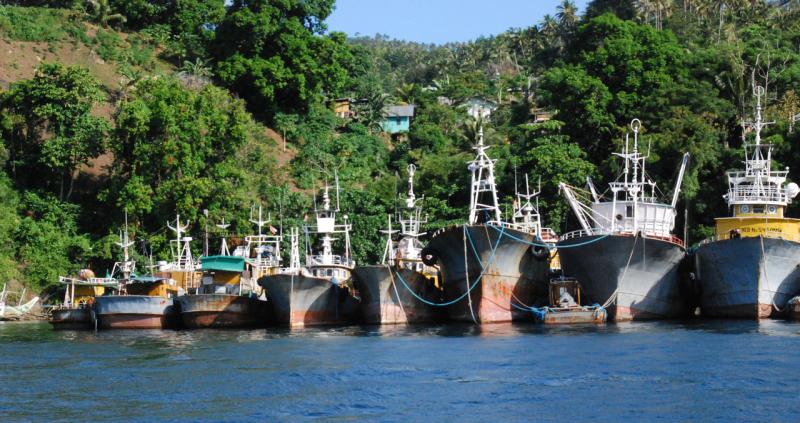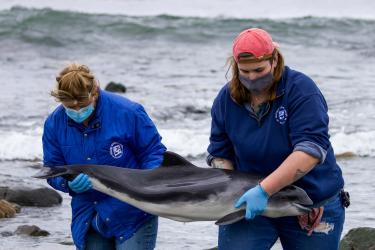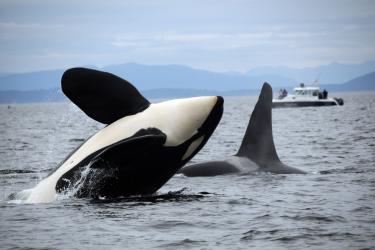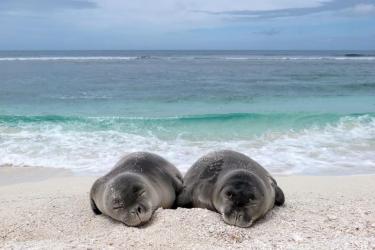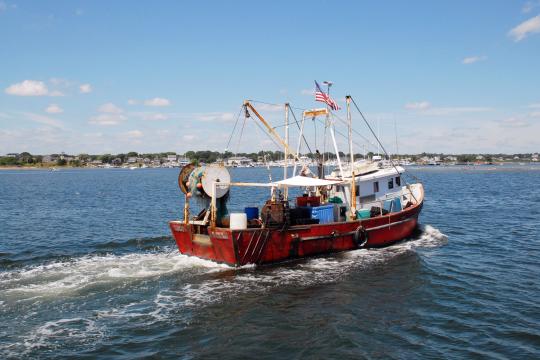Last week dignitaries from around the world traveled to Washington, DC, for the Our Ocean Conference to discuss global stewardship of ocean and marine resources; this story highlights the significance of global relationships.
The Port State Measures Agreement (PSMA) has long been a priority for the United States, the National Oceanic and Atmospheric Administration’s (NOAA) National Marine Fisheries Service, and the NOAA Office of Law Enforcement (OLE). In June, 29 countries and the European Union ratified the agreement and it entered into force globally, providing parties with minimum standards for implementing port controls aimed at preventing the offload and sale of illegal, unreported, and unregulated (IUU) fishing products.
As part of the U.S. implementation of the international agreement, NOAA was identified as one of the lead agencies for capacity building, technical assistance, and implementation training—something OLE has been doing for years.
For the past 3 years, OLE has been working with the Ministry of Marine Affairs and Fisheries (MMAF) in Indonesia to develop a training curriculum for fishery inspectors to carry out the provisions of the PSMA. Shortly after Indonesia ratified the PSMA, MMAF requested that OLE provide training and technical assistance to Indonesian officials from its organization, as well as Customs, Ministry of Foreign Affairs, and managers from major Indonesian fishing ports. Because the two enforcement offices have worked together for the past 8 years, hosting the pilot implementation training in Indonesia seemed a perfect fit.
In collaboration with the U.S. Agency for International Development, a team of OLE technical advisors traveled to Manado, Indonesia, to conduct both a collaborative and regionally focused workshop on the implementation of PSMA and combating IUU fishing, as well as training for fisheries officials on best practices to implement PSMA in accordance with international and national laws.
Day 1: Workshop on the Implementation of the PSMA

More than 75 people attended the opening day workshop. This included representatives from OLE, the Australian Embassy in Jakarta, Coral Triangle Initiative, the Regional Plan of Action to Promote Responsible Fishing Practices Including Combating Illegal, Unreported, and Unregulated Fishing (RPOA-IUU), the Packard Foundation, and participants from 10 Indonesian Ministries. OLE participated in discussions focused on combating IUU fishing in Indonesia and the role of PSMA to combat IUU fishing. As a panelist, OLE shared insight on the United States’ implementation of the agreement alongside the Australian, Indonesian, and RPOA-IUU implementation perspectives. These discussions exposed participants to various experiences on PSMA implementation and allowed them to actively engage in discussions related to Indonesia’s PSMA implementation plan. This open communication was integral to the success of the workshop as international collaboration and communication is essential for the successful global implementation of the PSMA and for deterring and preventing IUU fishing.

Sumono Darwinto (center), Chief of Pontianak station, MMAF Surveillance of Marine Resources and Fisheries, alongside an Indonesian Naval Officer, listened to the PSMA implementation panel discussions. Darwinto answered several audience questions related to local enforcement practices and laws.

With 17,500 islands and 95,000 km of coastline, Indonesia faces extreme challenges in detecting IUU fishing in their waters. Patrolling through clusters of vessels operating near the maritime boundaries is one tactic used by Indonesian marine enforcement agencies. There is also interest in strengthening interagency cooperation such as expanded efforts of the Navy to conduct surveillance, as well as increased communication and collaboration with bordering countries such as Malaysia and the Philippines. Regional cooperation and communication on IUU fishing issues is continuing to expand through the efforts of the RPOA-IUU and all of its members throughout Southeast Asia.

Currently, Indonesian officials face significant challenges with foreign fishing vessels illegally fishing in Indonesian waters. The vessels pictured near the Bitung Port were seized for illegal fishing and await proper disposal.
Day 2: Understanding the basics
With heavy emphasis on training modules, day 2 began by introducing a core group of 36 trainees to the key obligations, operational requirements, and minimum standards set forth by the Port State Measures Agreement.
With the U.S. being one of the lead negotiating members of the PSMA, OLE is well versed on the provisions and able to articulate the key operational components of the agreement. OLE trainers explained that the PSMA applies to foreign-flagged fishing vessels requesting access to Indonesian ports, provided training on the examination of pre-arrival information to screen arriving vessels, discussed the full requirements of conducting a PSMA inspection, and emphasized the importance of the increased information sharing and communication among member Parties required by the agreement.
Day 3: Conducting a thorough PSMA boarding
On day 3 training focused on proper inspection procedures, including thorough inspection of gear, catch, and vessel documents, as well as evidence collection.

A member of the Indonesian Ministry of Marine Affairs and Fisheries watched as small, local fishing vessels passed the commercial dock.
Day 4: Practical application, staged scenarios

When it came time for the students to implement all they had learned, the 36 core trainees broke into four groups and prepared to conduct boardings in the Port of Bitung. There were two vessels to board and two very different scenarios to explore. OLE Special Agent Paige Casey (left) briefed a small group of trainees on one scenario, which involved conducting an inspection of a carrier vessel.

OLE Lieutenant Joe Scarpa (right), with interpreter Adhi Ariebowo, went over final training messages before having another group of trainees board the vessel with a staged training scenario related to markings and gear compliance.

Buddy Setiawan from the Jakarta Base of Surveillance for Marine and Fisheries Resources was prepared for the hands-on portion of training, bringing a camera to properly document any needed evidence of infractions to accompany the inspection report in a real-world scenario.
As part of the initial walkthrough for hands-on scenario training, participants had to ask acting crew members (who were also classmates) for a variety of information related to the vessel’s activities before entering port. Upon boarding, participants gathered the crew, asked appropriate questions, checked logbooks and other documentation, and began conducting a thorough inspection of the vessel. This meant checking all the holds and crawl spaces, measuring vessel numbering and names, examining gear, and ensuring comprehensive compliance with relevant international requirements.
OLE trainers were nearby, monitoring progress and asking questions to make sure all inspection steps were conducted. They also provided additional support when the students asked. OLE Lieutenant Scarpa (left) showed a group of Indonesian participants how to properly measure vessel markings.
When several infractions were identified, appropriate simulated enforcement actions were taken by participants. These actions included filling out proper PSMA annexes documenting the violations and preparing other documents and evidence to send to the vessel’s flag state. Students debriefed their respective OLE trainers before departing the vessel. During these discussions, participants recapped the scenario from beginning to end, while trainers provided feedback on what they observed.
By the end of the day, each student had participated in two hands-on boarding scenarios. Students indicated they had a better understanding of what to look for, what questions to ask, and how to effectively conduct an inspection compliant with the standards of the PSMA.
Day 5: Final discussions, graduation, and planning ahead.
The last day began with a debrief of the various “mock boarding” scenarios and lessons learned from the day 4 boarding exercises, as well as training on electronic vessel tracking systems, final steps to be taken after the inspection, and proper documentation of the boarding results. The remainder of the day focused on an open-floor discussion about the week’s training.
Since this was the “pilot” PSMA training in Indonesia, OLE trainers wanted to ensure the curriculum and exercises met the needs of their Indonesian counterparts, as well as the formal training requirements of Indonesia’s Training Center. Participants were asked to provide feedback and recommendations on improvements for the training before the PSMA course is finalized for broader use within Indonesia. There was also discussion about the next steps in PSMA implementation training for the international partners.
After a long, grueling week, participants were happy to receive their certificates of completion.
For more information about this workshop or other OLE PSMA implementation training events, visit OLE or the IUU webportal.
--
Story and photos by Ally Rogers, communications specialist for NOAA’s Office of Law Enforcement. To contact her, please call 301-427-8255 or email allyson.rogers@noaa.gov.
